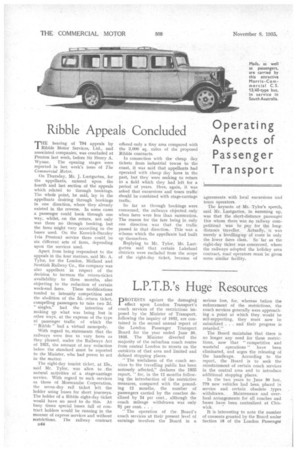Ribble Appeals Concluded
Page 198

If you've noticed an error in this article please click here to report it so we can fix it.
Thearing of 794 appeals by Ribble Motor Services, Ltd., and associated companies, was concluded at Preston last week, before Sir Henry A. Wynne. The opening stages were reported in last week's issue of The Commercial Motor.
On Thursday, Mr. J. Lustgarten, for the appellants, entered upon the fourth and last section of the appeals which related to through bookings. The whole point, he said, lay in the appellants desiring through bookings in one direction, where they already existed ihi the reverse. In some cases a passenger could book through one way, whilst, on the return, not only was there no through booking, but the fares might vary according to the buses used. On the Keswick-Burnley (via Preston) service there could, be six different sets of fares, depending upon the services used.
Apart from being respondent to the appeals in the four matters, said Mr. A. Tylor, for the London, Midland and Scottish Railway Co., the company was also appellant in respect of the decision to increase the return-ticket availability to three months, also objecting to the reduction of certain week-end fares. These modifications tended to intensify competition and the abolition of the 3d.return ticket, compelling passengers to take two 2d. " singles," had the intention of making up what was being lost in other ways, at the expense of the type of passenger traffic of which the " Ribble" had a virtual monopoly.
With regard to. statements that the railways were free to vary fares as they pleased, under the Railways Act of 1921, the amount of any reduction below the standard must be reported to the Minister, who had power to act in the matter.
The eight-day tourist ticket, at 15s., said Mr. Tylor, was alien to the natural activities of a stage-carriage service. With regard to such services as those of Morecambe Corporation, the seven-day rail ticket left the holder using buses for short journeys. The holder of a Ribble eight-day ticket would have no need to do this. At busy times special buses full of contract holders would be running in the manner of express services and without restrictions. The railway contract n44 offered only a tiny area compared with the 3,000 sq. miles of the proposed Ribble contracts.
In connection with the cheap day tickets from industrial towns to the coast, it was said that appellants had operated with cheap day fares in the past, but they were seeking to return to a field which they had left for a period of years. Here, again, it was asked that excursions and tours traffic should be combined with stage-carriage traffic.
So far as through bookings were concerned, the railways objected only when fares were less than summation. The reason for the fare being in ,only one direction was that the traffic passed in that direction. This was a scheme which the appellants had built up themselves.
Replying to Mr. Tylor, Mr. Lustgarten said that certain Lakeland districts were excluded from the scope of the eight-day ticket, because of agreements with local excursions and tours operators.
The keynote of Mr. Tylor's speech, said Mr. Lustgarten, in summing up, was that the short-distance passenger (for whom there was no railway competition) was to pay for the long
distal-16e traveller. Actually, it was merely a levelling-up Of 'costs in only the lower fares class. So far as the eight-day ticket was coneerned, where the railways adopted the holiday area contract, road operators must be given some similar facility.












































































































































































































































































































